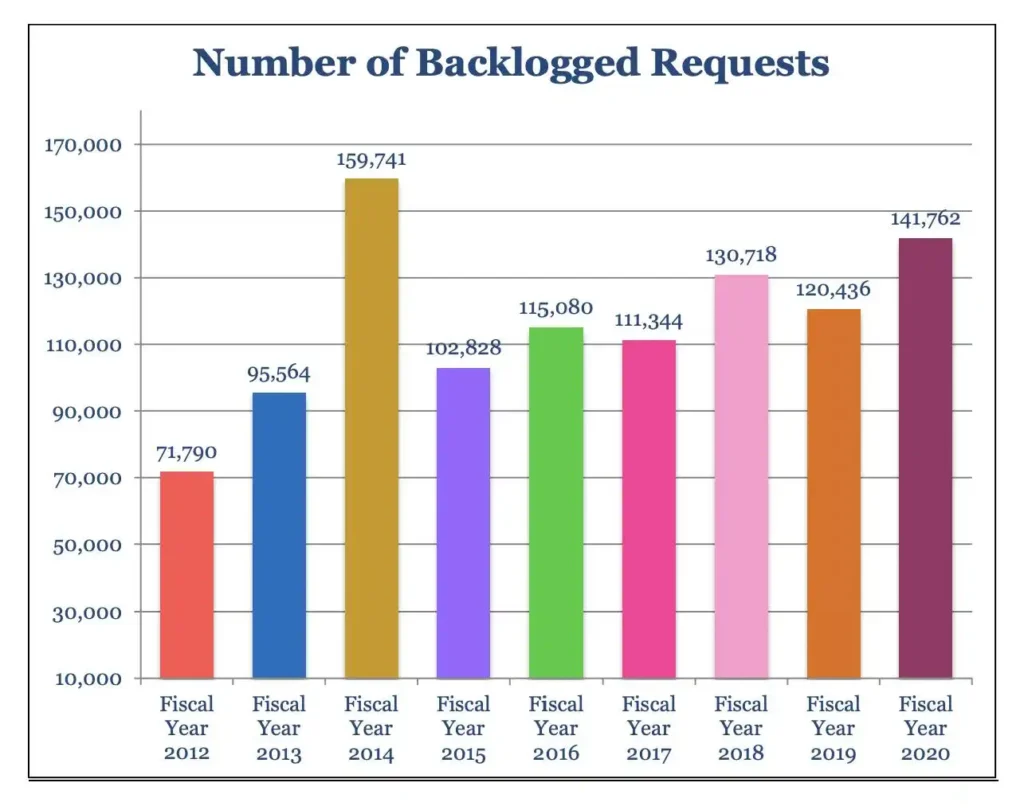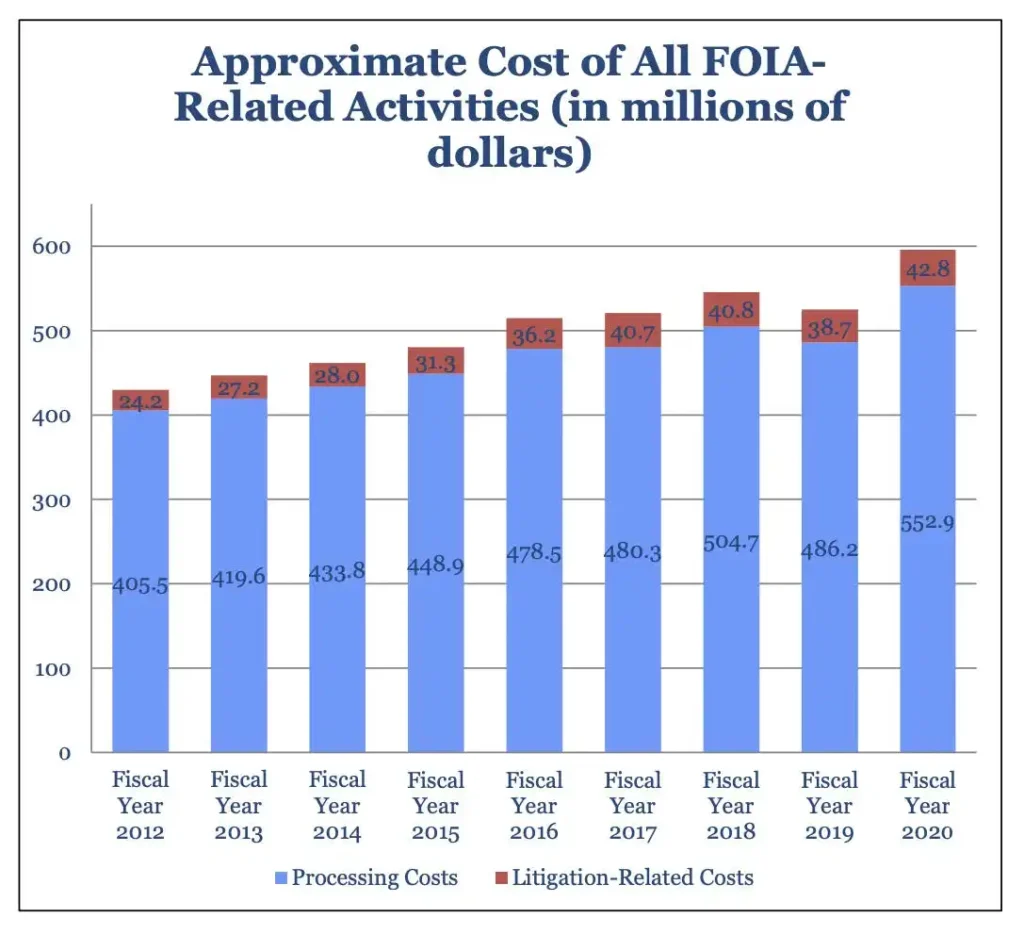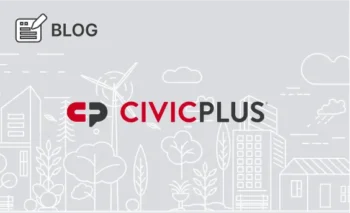Current Issues Affecting Public Records Request Management
As a public records management software company, we get to talk to folks from all types of agencies managing public records every day. We hear all kinds of use cases, from Police Departments and sheriff departments to small rural town clerks and large state departments. We also hear all types of public records difficulties as well.
From the ever-growing overall number of requests to the increasing complexity of request fulfillment, we wanted to break down some of the most common public records issues and offer ways to remedy them.
Backlogged Records Requests are on the Rise
It’s simple logic — as the U.S. population grows, the number of requests for information will increase. The federal FOIA requests have been at an all-time high since 2016, receiving almost 800,000 federal FOIA requests received in America each year from 2016 to 2020.
But when the COVID-19 pandemic began, backlogged cases sky-rocketed, increasing 17.7 percent from 2019, as seen in the chart below.
In FY 2020, the federal government received a total of 790,688 FOIA requests. The above data is just for federal requests, and it’s easy to see increases in public records across cities like Tacoma, Washington, and counties like Fairfax County, Virginia. However, the sum of all public records request numbers from every local and state municipality in the country is not tracked. What can be drawn from the federal numbers is that there’s likely a similar increase in requests in state and local agencies throughout the country.
Backlogged requests can lead to public record lawsuits from watch groups, news organizations, or everyday citizens. Using a public records request management system can help save time and money by streamlining the requests response workflow.
Backlogged Requests
The total number of backlogged requests across the government at the end of FY 2020 was 141,762, which is a 17.7 percent increase from the number of backlogged requests reported at the end of FY 2019. (1)

Legal Threats and Repeat Requesters
Public records lawsuits have been around as long as public records themselves, and following the previously established logic of more people + more public agencies= more public records requests. If there are more records requests, there will also be more lawsuits.
For example, in 2018, over 800 public records lawsuits were filed at the federal level, equating to a 67 percent increase from 2017. From a local and municipal standpoint, one of our customer onboarding specialists noticed a rise in threats of legal action some of the clerks she works with have been receiving when requests aren’t filled or simply aren’t fulfilled as quickly as desired.
Another way some requesters respond to unanswered requests or requests that don’t receive the attention they want right away is via a harassment tactic employed by resubmitting identical requests repeatedly.
In recent years, the term “vexatious requester” has become the go-to label in the U.S. for a resident who repeatedly attempts to get information from their government through frequent or voluminous requests. It’s no secret that government agencies struggle to respond to requests on time. An onslaught of vexatious requests can take valuable resources away from proposals in keeping with the law’s intent. Vexatious requesters have earned their name from the legal term “vexatious litigation,” which happens when “an action or the bringer of an action that is brought without sufficient grounds for winning, purely to annoy the defendant.” Other names for vexatious requesters are “frivolous requesters” and“recurrent requesters.”
In short, vexatious requesters often accomplish the opposite of their intended goal by clogging up request management systems. Then, both the requester and the requestee are left with a headache.
One example comes from the story of computer programmer Tim Clemans facing off with the Seattle Police Department by filing requests for all of the department’s dispatch calls, police reports, and videos. While he eventually dropped the excessive number of requests, agencies still were forced to spend time and energy responding to them.
Increasing Job Complexity
The sheer number of types of data considered public records has mushroomed in the last two decades, with the acceleration of digital bringing more attention to social media and email.
Social media is considered a public record law in all 50 states. Most states’ public records laws are that they define a record as content created “regardless of its physical form or characteristic.” But the thing about social media is that it’s very dynamic, meaning that people can edit, change, and delete their comments 24/7.
A recent CivicPlus® (formerly ArchiveSocial) study found that over one year, the likelihood of a social media record getting deleted was about one in 12. And for most public communicators, managing these platforms is only part of their role. Today, one in four records requests reference social media content, and three out of four agencies have received social media public records requests.
A dedicated and secure archiving software like ArchiveSocial, which captures and retains your records in context and in near-real time, can help reduce your risk and better ensure compliance so you can successfully communicate online. And with the email communications of public agency employees relevant to their work often considered public record, clerks now need to collect, redact, and sometimes string together tens to hundreds to even thousands of individual emails to a requester. We’ve come so far with technology, but with it, we’ve made the entire act of managing records requests so much more difficult.
You’ve no doubt seen news stories covering the implementation of body cameras in police departments across the nation. In the realm of the public record, issues with body cameras have ranged from a discussion about what footage is considered public record to the complications behind video redaction and storage.
It’s the latter issue here causing public records problems. Unlike a document or email, police-worn body cameras combined with their status as public records can create a lot more redaction effort, like video and audio censorship, for those who have to fulfill the requests.
Budgets and Resources
The graph below displays an increasing overall cost for federal FOIA-related activities, including staffing, tools, overtime necessary for responding to requests, and litigation costs. If an agency tends to have fewer FOIA requests, they are less likely to account for the need for staff if more requests come in that year.
It can be difficult to get records requests responded to in time for already stretched-thin teams, especially if there is no dedicated employee to respond to requests. Not including the budget for FOIA requests can also backfire. 7.2 percent of the amount spent in 2020 was on litigation, some of which likely resulted from backlogged requests.
Approximate Cost of All FOIA-Related Activities (in millions of dollars)
During FY 2020, 5559.37 “full-time FOIA staff” were devoted to the administration of the FOIA throughout the government (2). The total estimated cost of all FOIA-related activities across the government was $595,825,929.10. Nearly 93 percent ($552,944,675.00) of the total costs were attributed to the administrative processing of requests and appeals by agencies. Roughly 7.2% ($42,881,254.00) was reported to have been spent on litigation-related activities. By the end of the fiscal year, agencies reported collecting a total of $2,113,456.40 in FOIA fees. The FOIA fees collected in FY 2020 amount to less than .4 percent of the total costs related to the government’s FOIA activities.

COVID-19 and Working from Home
Between national controversies, protests, elections, and not to mention a global pandemic, there was no shortage of demand for public communicators in the past few years. The need to fulfill job functions remotely has been crucial for everyone, including those responsible for responding to FOIA requests.
When COVID-19 initially hit, ArchiveSocial saw a significant spike (44%) in daily social media usage, resulting in a substantial rise in the number of records archived. As public agencies continued to rely on social media to communicate to their audience, they reached new volumes of engagement, as well as trolling and misinformation. Citizens began to call for more accountability and transparency from their government, leading to a rise in social media-related lawsuits. Lawsuits involving First Amendment issues on social media increased from around one per month to nearly one new lawsuit every week.
The fact is, social media is our now and future. More than half the world now uses social media to seek answers to questions and get help. The CivicPlus State of Social Media Survey revealed that 70% of public communicators increased attention to digital services in the last year, and 25 percent have become more concerned about compliance with records laws, a 16.4 percent YoY increase.
Aside from these possible costs for lawsuits, agencies also face the likely costs of simply processing public records requests.
- The Georgia Emergency Management Agency estimated it would cost over $22k to respond to records requests for correspondence regarding COVID-19.
- The City of Elgin, TX, hired two additional staff members to try and handle the number of public records requests they’re receiving, nearly 20-30 per week.
- Loudon County, VA, recently fulfilled more than 500 FOIA requests, which cost them $36k to fulfill.
NextRequest has offered agencies the option to work remotely when necessary, given the unprecedented times we are experiencing. Using our software, a COVID outbreak in the office meant that quarantining employees were still able to fulfill records requests from home. Additional features like automated reporting, custom invoicing, and redaction tools help teams to efficiently manage tasks without letting any requests fall through the cracks.
Online communications have become part of the norm as communities seek more transparency and communication from their government, which has resulted in a steady uptick in public records requests. But the one thing that hasn’t increased is staff support. The timeframe to fulfill requests isn’t going to change, nor is the budget or resources you have to accomplish this. So, how can you simplify the process of maintaining and fulfilling requests while ensuring privacy and compliance? An archiving solution and FOIA software that can automate the process.
Remember, good archiving software should have near real-time capture, active monitoring, advanced search, annotations, alerts, and more. Good FOIA software should be able to reduce risks, speed your response time, and minimize your costs.
The Takeaway
Most of the problems affecting people who work with public records are symptoms of outdated request management systems. Besides, maybe the body camera example, backlogged requests and the legal threats and vexatious requesters that spawn from them are issues agencies can quickly alleviate with a modern software solution like NextRequest.
Our records request management software has tools like request tracking and due date notifications to prevent respondents from missing deadlines that might provoke repeat requests. Other features like redaction, reporting, document workflow, and request diversion offer more efficient request management to prevent request backlogging in the first place.
We’ve seen how vital social media usage has been in the past few years. Still, unfortunately, the networks just weren’t built with compliance in mind — this is why it’s so important to have an archive in place so you CAN comply with the public records laws in your state.
LINKS:
https://www.justice.gov/oip/page/file/1170146/download
https://www.thenewstribune.com/news/politics-government/article65673537.html
https://www.nfoic.org/blogs/foia-office-responds-thousands-requests-public-records/
https://foiaproject.org/2018/11/12/annual-report-foia-lawsuits-reach-record-highs-in-fy-2018/
https://www.heraldnet.com/news/ag-rejects-seattle-mans-request-for-600-million-emails/

